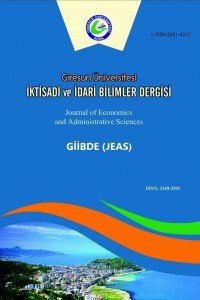FISCAL REFORMS of STATES in CANADA
Hükümetin sermaye fazlası bağlamında 1990’ların sonlarından itibaren Kanada, aktif olarak vergi reformlarını destekleyerek vergileri indirmektedir. Günümüzde birçok Kanadalının borçlanma faiz oranlarının kabul edilemez olduğunu düşünmeleri nedeniyle yerel hükümetlerin tamamı finansal-mali zorluklarla karşı karşıyadırlar. Bu çalışma, sadece ekonomik faktörlere bağlı olarak gerek federal gerekse yerel hükümetlerin ekonomik rollerini yeniden inşa etmek için önerilen iki yaklaşıma odaklanmaktadır. Diğer bir ifade ile söz konusu önerilerle hükümetlerin ilk iki seviyesinde görülen gelir dağılımı problemlerine çözüm üretilmesine çalışılmaktadır. İlk öneri oldukça merkezidir, çünkü kaynakların federal hükümete aktarılmadan önce eyalet yönetimlerinin finansal açıklarını kapatmaya yöneliktir. İkinci öneri ise ilkinin tersi bir yapıda olup; verginin, vergilendirme gücünün bölümlendirilmesi ve dikey finansal boşluğun ortadan kaldırılması konularında yani kendi vergi hareketlerini yönetme noktasında eyalet yönetimlerine çok daha fazla bağımsızlık vermektedir
Anahtar Kelimeler:
Mali reform, Kanada, Yerel hükümet, Merkezileşme
FISCAL REFORMS of STATES in CANADA
Canada has long-been a supporter of tax reform and actively cutting taxes since the late 90s, in a context of government surpluses. Today, all governments have a large fiscal challenge as they are accumulating debt at a rate that most Canadians consider unacceptable. This paper focuses on two recent proposals for restructuring of federal-provincial economic roles, both based on purely economic factors. In other words, the two proposals we studied were made to solve the current problems resulting from poor distribution of revenues between the first two levels of government. One is very centralized, based on the bailout of deficit provincial governments, before they give in return virtually all economic stabilization powers to the federal government. The other proposal is diametrically opposed because the new division of taxation powers and taxation and the elimination of vertical fiscal gap it plans would allow provincial governments to become much more independent in the conduct of their tax affairs
Keywords:
Fiscal reform, Canada, Provincial government, Centralized,
___
- Bakvis, H., Brown, D. M., & Baier, G. (2009), Contested federalism: Certainty and ambiguity in the Canadian federation. Oxford University Press, USA.
- Behnke, N., & Benz, A. (2009), “the Politics of Constitutional Change Between Reform and Evolution”, Publius: the Journal of Federalism, 39(2), 213-240.
- Béland, D. (2006), “the Politics of Social Learning: Finance, Institutions, and Pension Reform in the United States and Canada”, Governance, 19(4), 559-583.
- Béland, D., & Lecours, A. (2005), “the Politics of Territorial Solidarity Nationalism and Social Policy Reform in Canada, the United Kingdom, and Belgium”, Comparative Political Studies, 38(6), 676-703.
- Béland, D., & Myles, J. (2005), “12. Stasis Amidst Change: Canadian Pension Reform in An Age of Retrenchment”, Ageing and Pension Reform Around the World: Evidence from Eleven Countries, 252.
- Bordo, M. D., Jonung, L., & Markiewicz, A. (2013), “A Fiscal Union for the Euro: Some Lessons from History”, CESifo Economic Studies, ift001.
- Bosch, N., & Durán, J. M. (Eds.) (2008), Fiscal Federalism and Political Decentralization: Lessons from Spain, Germany and Canada, Edward Elgar Publishing.
- Boychuk, G. W. (2008), National Health Insurance in the United States and Canada: Race, Territory, and the Roots of Difference, Washington, DC: Georgetown University Press.
- Crossley, T. F., & Jeon, S. H. (2007), “Joint Taxation and the Labour Supply of Married Women: Evidence from the Canadian Tax Reform of 1988”, Fiscal Studies, 28(3), 343-365.
- Disney, R., & Emmerson, C. (2005). “Public Pension Reform in the United Kingdom: What Effect on the Financial Well Being of Current and Future Pensioners?”, Fiscal Studies, 26(1), 55-81.
- Gruber, J., & Wise, D. (2005). Social Security Programs and Retirement Around the World: Fiscal Implications, Introduction and Summary (No. w11290), National Bureau of Economic Research.
- Gruber, J., & Wise, D. A. (Eds.) (2009), Social Security Programs and Retirement Around the World: Fiscal Implications of Reform, University of Chicago Press.
- Hauptmeier, S., Heipertz, M., & Schuknecht, L. (2007), “Expenditure Reform in Industrialised Countries: A Case Study Approach”, Fiscal Studies, 28(3), 293-342.
- Lecours, A., & Béland, D. (2010), “Federalism and Fiscal Policy: the Politics of Equalization in Canada”, Publius: the Journal of Federalism, 40(4), 569-596.
- Martens-Weiner, J. (2006), Company Tax Reform in the European Union: Guidance from the United States and Canada on Implementing Formulary Apportionment in the EU, Springer Science & Business Media.
- Poterba, J.M., & von Hagen, J. (Eds.) (2008), Fiscal Institutions and Fiscal Performance, University of Chicago Press.
- Singh, N., & Rao, G. (2006), Political Economy of Federalism in India, OUP Catalogue.
- Weingast, B. R. (2009), “Second Generation Fiscal Federalism: the Implications of Fiscal
- Incentives”, Journal of Urban
- Economics, 65(3), 279-293.
- ISSN: 2149-3391
- Yayın Aralığı: Yılda 2 Sayı
- Başlangıç: 2015
- Yayıncı: Giresun Üniversitesi
Sayıdaki Diğer Makaleler
TÜRK DIŞ POLİTİKASI’NIN İŞLEYİŞİNDE DÜŞÜNCE KURULUŞLARININ ROLÜ
FISCAL REFORMS of STATES in CANADA
HİSSE SENEDİ PİYASALARINDA GÖRÜLEN ANOMALİLER: BORSA İSTANBUL ÖRNEĞİ
Hüseyin DAĞLI, Duygu Arslantürk ÇÖLLÜ
FUTURE DESIGNS for GLOBAL ENVIRONMENTAL MANAGEMENT: WHAT HAS BEEN DONE? WHAT CAN BE DONE?
İSLÂM ÖNCESİ TÜRK DEVLETLERİ’NDE ARİSTOKRAT CUMHURİYET GERÇEĞİ
MUHASEBE HİLELERİNİN ÖNLENMESİNDE İÇ KONTROL SİSTEMİNİN ÖNEMİ ÜZERİNE BİR ARAŞTIRMA
AMERİKAN DIŞ POLİTİKASINDAKİ JEOPOLİTİK DÖNÜŞÜMÜN MİMARI: ROBERT STRAUSZ – HUPÉ
PETROL FİYATLARININ İŞLETME YATIRIMLARI ÜZERİNE ETKİSİ: TÜRKİYE PETROKİMYA İŞLETMELERİ ÖRNEĞİ
